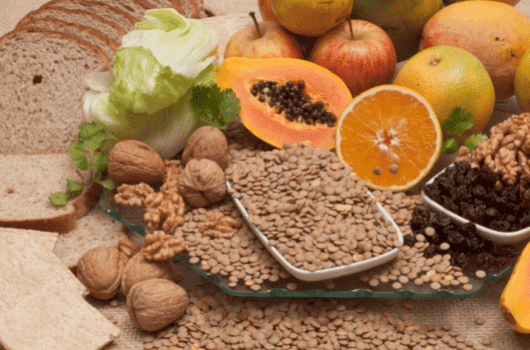
In light of World Digestive Health Day and with this year’s focus on obesity and digestion, we wanted to get some expert opinions from one of our Registered Dietitian collaborators, Kwayera Simpson.
1.This year, World Digestive Health Day’s theme is Obesity and Digestion. How are the two connected?
Having a variety of foods in our diet can support good digestion and promote a healthy micro biome. This can be achieved by consuming you 5 a day of fruit and vegetables. A good routine of fruit and vegetables will boost your fibre intake.
Eating good sources of fibre will mean you are less likely to engage in excess snacking as you should feel fuller for longer. There are huge benefits to increasing your dietary fibre include reducing the risk of:
Cardiovascular disease
Type II diabetes
Stroke
Colorectal cancer and other conditions
Fibre can help have a positive effect on how you feel; improving your mood and help you with your weight loss goals.

2.Can being a healthy weight have an impact on our digestion?
The benefits of being a healthy weight are huge; including improved bowel movements and less constipation and bloating. According to the World Health Organisation, being a healthy weight reduces your risk of non-communicable diseases such as diabetes, stroke, heart attack and most cancers.
3.What causes heartburn and acid reflux and how can I prevent them from happening?
There are several things that may cause acid reflux and heartburn. Normally a full analysis of a person’s lifestyle is required to identify the causes and triggers. From a dietary perspective, the main triggers include being overweight, spicy foods, fatty foods, excess coffee, alcohol, chocolate and tomatoes. In addition, lifestyle factors like smoking and being stressed can play a big role in this too.
Ways to prevent and reduce symptoms of reflux and heartburn could include:
Eating smaller portions
Having your last meal 4 hours before bedtime
Sitting upright while eating and after eating to allow digestion
If you’re struggling at finding your triggers, it’s best to speak to a healthcare professional – they will typical ask you to complete a food symptom diary to detect when you have a flare up. Sometimes symptoms are triggered the day after the culprit food or activity is identified - this can be common for IBS patients.

4. We all know it’s really important to have enough fibre in our diet to support our gut health. Why is it so important and do you have any tips for getting 30g a day?
Fibre has become an increasingly hot topic; fibre helps with retaining a healthy digestive system. Fibre can also influence blood sugar levels, slowing down the release of sugars from your food into your bloodstream. Whole grain foods have been known protect your heart too -eating more fibre could protect you against conditions such as a stroke, muscular degeneration, reducing your symptoms of asthma, improving your digestive health, and supporting bone health. Not to mention Fibre can also help you feel fuller for longer!
Getting your ‘5 a day’ is the best way to consume the recommended daily amount of 30g of fibre per day. Other ways would include opting for whole-grain pastas, rice and bread to help increase the fibre intake.
Top Tip! Leaving the skin on your vegetables like potatoes, carrots and parsnips is a quick and easy way to increase fibre intake!
In need of some gut-friendly meal inspiration? Check out my Lentil and Chicken Stew recipe below:
5. Drastic diet and lifestyle changes can result in changes in toilet habits. What can we do to dampen the symptoms and when should we see a health care professional?
If you’re having any drastic changes in your bowels you should always seek advice from a healthcare professional. It’s also important that you take a staggered approach to any diet and lifestyle changes instead of drastic ones. Dietitians like to promote a staggered approach where people make gradual changes by gradually increasing fibre in your diet.
6. A lot of sources online and in the media recommend us not to eat too late at night. Does the timing of our meals impact our digestion? Can eating too late impact our weight?
We recommend eating three meals a day in line of healthy eating guidelines. However, we understand that not everybody has a 9-5 lifestyle and work patterns influence eating times so your mealtimes are very individual to you! we would recommend having your meal spaced out appropriately throughout the day; for example eating at 8am, 12pm and 4pm.
If you are eating late at night and notice changes in bowel movements and discomfort, then it might be worth altering your meal times -aim for your last meal to be 3 hours before sleep to support good digestion.
7. Gluten has been a bit of a demonised nutrient in recent years. Should we all be avoiding gluten to improve our digestive health?
We should not be avoiding gluten unless you have been told by your GP, registered dietitian, or a health care professional. Having a diet with a good variety of proteins, wholegrains and fruit and vegetables is a good starting point to improve digestive health.
8. The low FODMAP diet is believed to be effective in reducing IBS symptoms. What is the low FODMAP diet and who should be following it?
Irritable bowel syndrome (IBS) is the name given to ongoing symptoms comprising of frequent abdominal discomfort and bowel changes.
Symptoms may include:
Abdominal cramps
Bloating and swelling of the abdomen
Constipation
Diarrhoea
Excessive wind
Incomplete bowel evacuation
FODMAP Stands for...
Fermentable
Oligosaccharides
Disaccharides
Monosaccharides
Polyols
And this means that FODMAP is made up of milk products, wheat, fruit, and vegetables which can be tricky to avoid. FODMAP diet involves avoiding foods that are not easily broken down by the gut. The diet can be highly restrictive for some and should be done under the close monitoring of a dietitian. Speak to your GP or dietitian to take you through the steps safely.

Related Articles










